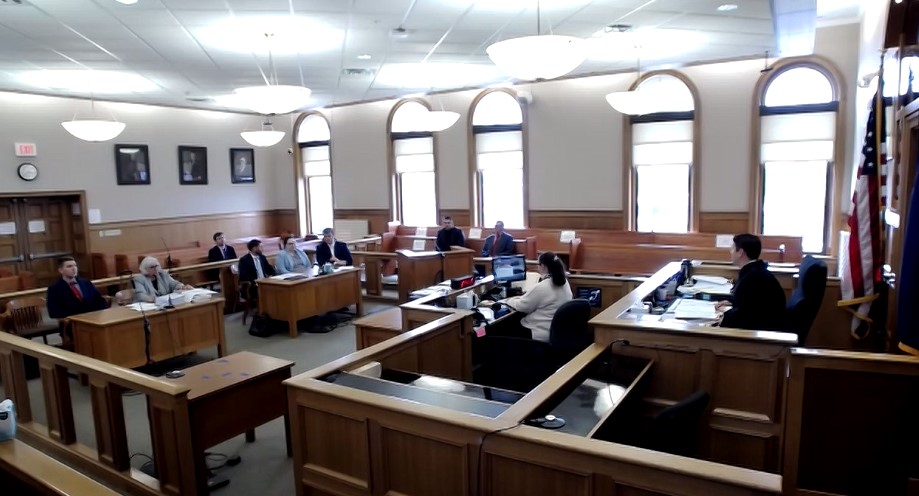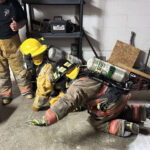
HOULTON, Maine — A Caribou woman accused of setting a fatal fire last year pleaded guilty to a felony charge of manslaughter Wednesday, thus waiving her right to a trial.
In March 2023, Susan Kochanowski, 35, was arrested and charged with murder and arson two months after a fire at 7 Water St. in Caribou on Jan. 25 that displaced 21 residents and killed 30-year-old Jason Donahue, with whom she lived.
During her arraignment last spring, Kochanowski pleaded not guilty, but she changed her plea to not criminally responsible in February.
On Wednesday, Superior Court Justice Stephen Nelson granted Kochanowski’s request to plead guilty after being convinced that she was not making that decision under duress or pressure from anyone, including her attorneys.
Nelson also ordered that the Maine Department of Health and Human Services place Kochanowski in an institution that specializes in treating mental illnesses and that she not be released unless a court finds that her release would not likely result in injuries to any person.
Nelson said that the state’s evidence supports the conclusion that Kochanowski’s mental health had deteriorated to the point where she did not understand the wrongfulness of actions that led to the fire and Donahue’s death.
Nelson had denied Kochanowski bail in December, saying that the court had clear and convincing evidence of a substantial risk that she would pose a danger to the public.
Kochanowski’s trial would have been held June 6. In pleading guilty, she gave up her right to have a jury determine whether the state proved beyond a reasonable doubt that her actions caused Donahue’s death.
Through her guilty plea, Kochanowski also waived her right to contest the state’s use of evidence in their case. This month, Nelson postponed a hearing to consider excluding evidence that Kochanowski’s attorneys believe is irrelevant, harmful or inadmissible to the case.
Kochanowski’s motions included a request that the court exclude statements that she allegedly made to medical providers and prevent references to Donahue as a “victim” or “alleged victim.”
During the fire, Kochanowski jumped from a second-story window into a river. She was being treated for hypothermia and shock when she told medical providers that she started the fire, according to her attorneys Adam Swanson and Ben Everett.
The attorneys argued that the court should eliminate Kochanowski’s statements on the basis of provider-patient privilege and that there’s no way a jury could determine if her statements are reliable.
Kochanowski suffers from several mental health disorders, including ADHD, bipolar disorder, PTSD and anxiety, and she is unemployed and clinically disabled. She also has fibromyalgia, which causes chronic muscle pain and fatigue. Her attorneys argued that she is not criminally responsible for starting the fire because of her mental health conditions and the trauma she endured after the fire.
The motion to request alternative evidence had also stated that Kochanowski claimed a man named Curtis Bliss attempted to light her on fire with a lighter and aerosol on the night of the blaze, and that he struck her head with a frying pan. Kochanowski’s ex-husband, Stephen Bonner, said that she sometimes called Donahue “Curtis.”
Donahue’s body was allegedly found next to a torch-style lighter and dented frying pan, meaning that he had a “means, motive and opportunity” to commit arson, Kochanowski’s attorneys had argued in the motion.
On Wednesday at Houlton District Court, Maine Assistant Attorney General Leane Zainea summarized the evidence that she would have presented at Kochanowski’s jury trial in June.
Zainea said she would have called to the witness stand several Water Street residents who evacuated the apartment building around 2 a.m. Jan. 25, 2023 after hearing alarms or seeing smoke.
Crystal Lewis, who lives across the street from 7 Water St., would have testified that she alerted firefighters that Kochanowski was in the stream below the building and that they pulled her to safety, Zainea said.
Caribou firefighters Scott Michaud and Matthew Russell would have stated that they could not enter Donahue and Kochanowski’s apartment due to extensive smoke, but it appeared that the fire had started in their apartment unit, Zainea said.
Caribou police officer Corey Saucier also claimed that he saw smoke and flames coming from that area of the building, Zainea noted.
Investigators from the Maine state fire marshal’s office allegedly found a frying pan and torch in the bedroom area of Donahue and Kochanowski’s apartment. Donahue, who was found two days after the fire, died of smoke inhalation and thermal burns on his back, according to the state medical examiner.
April O’Grady, a clinical and forensic psychologist, testified Wednesday that Kochanowski’s medical records indicate that she suffered from psychosis following the fire and still exhibited those symptoms after being transported to Dorothea Dix Psychiatric Center in Bangor.
On Wednesday, several of Donahue’s family members spoke of how his violent death has affected them.
Donahue’s mother Jennifer Paulin read a statement on behalf of his father, Stephen Donahue. She said that her son had a kind heart and offered his help to anyone in need, even with shopping, laundry and washing dishes. He was one of four siblings, three of whom are now left devastated after his death.
“It’s still hard to accept this new reality without him,” Paulin said.
Rachel Lagoi, Donahue’s sister, stated that since his death she has gone on medication for depression and anxiety, which she never needed before. She has suffered from PTSD and only recently began working and attending social events again.
“Jason had the biggest heart and was never mean to anyone. When we were kids, he would always tell me to be nice,” Lagoi said. “I’ve never met the defendant [Kochanowski]. I know Jason is with me now in this courtroom, telling me to be nice.”







